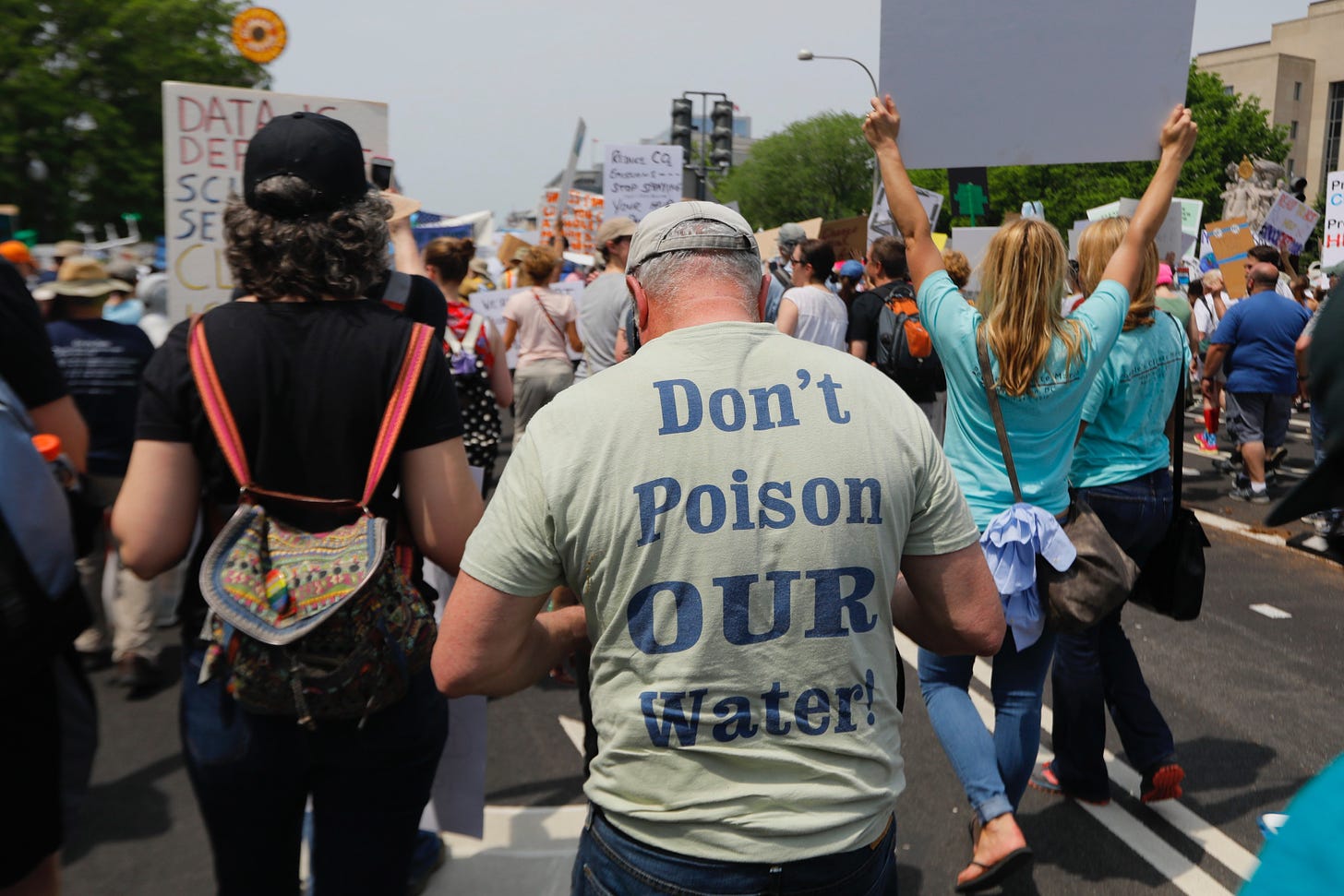The Communities Rising To Fight Pollution
Updates From Community Members In Missouri, Michigan, & Maine
Drinking contaminated water is a threat I’ve spent decades working on. This problem affects millions of Americans, and millions of citizens throughout the world. Water pollution is one of the greatest risks to human health, and few of us realize the intensifying burdens on our world’s water resources until these problems turn up at our door.
Ongoing infrastructure issues, lack of resources, misappropriated funds, and shortsighted decisions go right along with toxic contamination to impact our water supply each day.
Today, we’re following up on a few communities that have been working hard to clean up the water and air for their neighbors and beyond.
No matter how long it takes to enact change, I want to honor the journey of anyone who has found the courage and effort it takes to speak up and work to make a difference in your community. Keep putting attention on your message and remember how many people will benefit from your continued effort.
First Up: Columbia, Missouri
Julie and Marie-Josee are the founders of COMO Safe Water Coalition (CSWC), a group created to discuss and improve their city’s water quality. Since 2009, Columbia Water and Light has used chloramines to disinfect its drinking water and to control high levels of trihalomethanes.
On February 22, The City of Columbia Water & Light is hosting an open house event at Columbia City Hall from 4-6 p.m.
They will be talking about a $24.5 million project to restore the water plant’s capacity. The project includes rehabilitation and replacement projects that will enhance the performance and extend the life of the facility. During the meeting, citizens will be able to review plans, ask questions, make comments, and complete a public comment form.
And the CSWC founders are asking for all hands on deck—for everyone in Columbia to attend the meeting if they can. They are concerned that these “rehabilitation and replacement projects" aren't enough and are advocating for real change with the water treatment in their city.
On their Facebook page, they wrote:
What do you think our citizens deserve? Are you willing to pay $2-$4 a month more for safer water (think activated carbon that really cleans our water)?
Isn't it equitable to make REAL changes so that public health of our most vulnerable is considered?
We will take your comments with us. But your presence will speak volumes. Thank you for supporting safe water in Columbia.
I’m rooting for a resolution to this city’s water woes and hope more citizens can get involved—ask questions and let your voices be heard.
Legal Action In Kalamazoo, Michigan
A class-action lawsuit filed by residents who are fed up with emissions from a nearby Kalamazoo cardboard packaging plant is moving forward.
U.S. District Court Judge Janet Neff denied a motion by the company, Graphic Packaging International, to dismiss or stay the lawsuit in a ruling in U.S. District Court Western District of Michigan.
We featured Brandi Crawford-Johnson’s story back in December, and she’s moving ahead. She’s continuing to meet with state regulators and asking them to revoke Graphic Packaging's permit and make numerous changes at the State protection agency.
“They should have never allowed GPI to expand next to a fence line community already facing a 14-year death gap,” she wrote in an email to The Brockovich Report. “They never did any enforcement for the twelve years GPI has been out of compliance for their toxic gas leaks. Not one penalty fine was given to one of the top 50 toxic and air polluters in the U.S.”
She also spoke at a recent Climate Plan meeting and asked for more air monitors to be put in all across the state.
The Michigan Department of Health and Human Services has said it plans to release a report studying possible long-term health impacts from exposure to hydrogen sulfide by the end of March. Hydrogen sulfide is an unregulated gas emitted Graphic Packaging International.
Keep up the great work, Brandi! We are hoping for justice for this community soon.
Maine Seeking A Ban On Sludge
A new proposed bill, LD 1911, in Maine looks to ban spreading biosolids or sludge as fertilizer on farmland.
We have written about this HUGE sludge issue before because it contains PFAS chemicals leftover from wastewater treatment plants. For decades, these toxic chemicals have been oozing into the topsoil and groundwater causing major problems for farmers and private citizens in Maine.
The new bill calls for the sludge to be disposed in landfills only, which could cause other issues, but is a step forward in this contamination case.
The bill also looks to require sewage plants to test treated wastewater for PFAS.
The toxic compounds have tainted hundreds of private drinking wells and farms in Fairfield and throughout the state.
And testing continues as 34 towns with 700 total sites have been identified by the Department of Environmental Protection as a top priority for PFAS testing. It's expected to take several years to complete all of the tests.
I hope this commonsense legislation passes. Now if only we could expand this ban throughout the country and make some headway on our sludge problems. I’m confident we will, it’s just a matter of how long it will take for lawmakers to truly understand the impact of this issue and to act swiftly and help those suffering.
What’s happening in your town? Let us know in the comments below.





Please see this on action & outcry against a lingering cover-up & debacle of an unregulated ethanol facility cooking up Toxin-treated seed corn/grain that is polluting Rural Nebraska: - https://journalstar.com/news/state-and-regional/govt-and-politics/group-demands-answers-on-alten-state-says-its-working-as-quickly-as-it-can-on/article_63a4c4d8-eeea-5f21-85f6-7bd8b7da77ea.html
https://www.facebook.com/groups/cleanwatersycamore/?ref=share